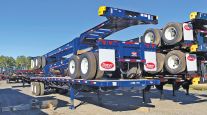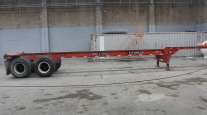Fix the Chassis Fix
It took years for the trucking industry to get Congress to place responsibility for intermodal freight chassis road worthiness in the correct place. In 2005, legislators specified that the providers of the equipment — and not the fleets that were using them to move freight — had to ensure that the units met all safety standards.
It was a hard-fought battle, as chassis providers — including ship lines that carry the containers here from abroad — resisted the determination. But eventually common sense — and trucking — prevailed.
It took six years for the Federal Motor Carrier Safety Administration’s regulations to fully go into effect.
So it is particularly galling to learn that despite the new regulations, many roadside inspectors are still placing the blame on truck drivers when chassis are found to be out of compliance.
It’s bad enough that drivers and carriers that are cited for these violations may be liable for fines and other sanctions. But now, thanks to the FMCSA’s new safety regime, carriers are finding their safety scores damaged by these wrongful citations. And the potential implications of a poor score in the agency’s Compliance, Safety, Accountability program can have a profound effect on a fleet’s business.
To compound matters, when fleets and American Trucking Associations have pointed out the problem, FMCSA’s response has been unsatisfactory.
“We are getting charged with trailing unit violations . . . that should be the responsibility of the intermodal equipment provider,” said Jeff Lang, chairman of ATA’s Intermodal Motor Carriers Conference.
Curtis Whalen, executive director of the IMCC, told us that the violations are often for elements on the chassis that can’t be inspected by drivers without crawling under the unit. Such violations, which are undetectable by the driver without such inspections, are supposed to be charged against the equipment’s owner.
But many roadside inspectors are ignoring the regulations and punishing the driver.
When asked about these complaints, an FMCSA spokesman told us that the inspection procedures mandated by the agency are being implemented properly and that its dispute-resolution procedures were also functioning as intended.
Just writing the rules isn’t sufficient. FMCSA needs to ensure that the chassis roadability regulations are being enforced properly and that the right parties are being cited for violations. And when mistakes are made in the field, the agency has to make sure that it doesn’t unfairly harm carriers’ safety ratings.




